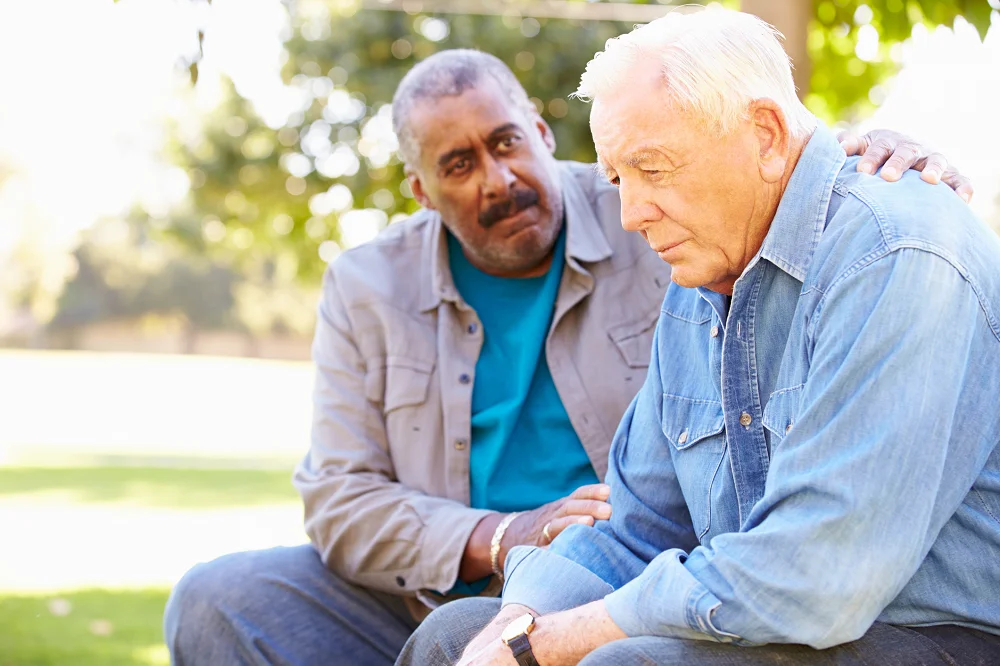Physical injuries are a blessing when compared to mental traumas that we suffer. Typically, contusions offer discoloration, fractures offer deformity, and lacerations requiring stitches present with obvious needs for medical intervention. But when our psyche has been trucked by the emotional trauma that accompanies life, there is no outward bleeding, life’s bruises are not as apparent on the mind, and there is no angulated fracture on an x-ray to finger. Imagine the damage we can cause an untreated break if we continue through life bearing full weight on it. Apply the same to our psyche. Here are four ways to identify mental injuries in people we are close to, and two ways we can intervene.
1) Loss of Interest: Sometimes when we experience pain, we make a concerted effort not to re-experience that pain. Think about a sprained ankle. We limp and favor that leg until the pain is not as intense. We use crutches to completely eliminate the full weight of everyday life. People will immobilize their legs on a scooter, and they roll around completely avoiding using the limb. Similarly, when someone suffers a mental injury, they become avoidant. Things that were once pleasurable will lose their flavor. They work to avoid being in a place that may exacerbate the pain they experience, no differently than with a bad leg. An individual with a mental injury may recluse, so as to avoid people, believing that it will help ease the pain they experience.
2) Changes to Appetite: There are times when pain (physical and mental) becomes so intense that some experience major changes to their appetite. Loss of appetite seems obvious. How can someone think about food in a time of intense pain. However, the brain’s pleasure pathway is activated by eating. When the brain is experiencing depressed mood or worse, it will try to right the ship. Hits of dopamine, which is released during oral intake, is one way to bring about temporary relief. Salty, fatty, sugary foods all activate the pleasure pathway of the brain. Any changes to appetite could be an indicator.
3) Self-Medication: The brain will seek to self-regulate itself using substances, both legal and illicit. During periods of mental suffering the brain is very interested in relief. In the absence of effective coping strategies and / or prescribed psychotropics, the brain will take whatever it can get. Experimenting with substances may, albeit maladaptively, bring about a feeling of temporary relief from mental anguish. A more obvious indicator of psychological pain is changes in use of substances. But what about someone who uses legal substances like alcohol, tobacco, marijuana, even food?? The answer to the question is twofold. First, has there been a change? Second, is there any utility in the person’s usage? An example of utility would be drinking to relax or forget.
4) Changes in Relationships: It is hard to pour into relationships with others when our inner world is on the ropes. You may not know the pain people are experiencing psychologically, but you can tell something is off in the relationships they hold. Texting and calling becomes infrequent or messages go unanswered. As previously mentioned, people recluse and stop participating in activities, groups, or events with others. There is a feeling of “distance” in the relationship. Conflict may arise where there had previously been none. These symptoms combined with any of the others begin to paint a picture of someone who is struggling internally.
How do we intervene and help our friends, colleagues, and family through difficult times when they suffer from a mental injury?
1) Self-Disclosure: Misery truly loves company! Sharing your experiences and related feelings may help people feel more “normal”. Abnormal situations bring about abnormal responses in people. AND THAT’S TOTALLY NORMAL! But people don’t feel normal. In fact, people tend to feel the opposite, wondering if they are the only ones who have ever felt this way. Providing disclosure and normalizing the individual’s response greatly reduces their risk of more complicated feeling expressions down the road.
Elevate the Conversation: If we needed a referral for a good primary care physician, we could probably post the inquiry to social media and get dozens of responses. Everyone seems to have a primary care physician for a physical or for the sniffles. But what happens when our psyche encounters one of life’s little hiccups? A desperate search for a counselor with openings ensues… sometimes. More often than not we endure the pain hoping time will heal the wound. But there is a better way. If we talked about our mental injuries as pragmatically as we talked about a twisted ankle, the concept of treatment would not be such a mystery. Openly discussing distressing times, like the death of a loved one, and the excellent therapist that walked with you through your grief helps to plant a seed for those who are suffering. You help to normalize the grief process, including working with mental health professionals, when you pragmatically describe your experience in counseling as if you were seeing the PA at your doctor’s office. The more casually we talk about our experiences with mental health, the more the conversation is elevated in the circles of the people we love.



